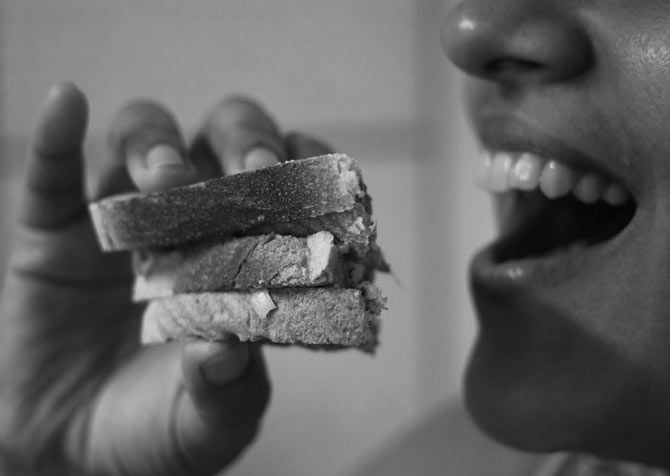More than 80 per cent of the commonly available bread forms contain cancer-causing chemicals, a report from the Centre for Science and Environment has found.

Bread samples in Delhi contained cancer-causing chemicals, a study released today said, prompting the Union Health Ministry to order a probe.
Nearly 84 percent of 38 commonly available brands of pre-packaged breads including pav and buns, tested positive for potassium bromate and potassium iodate, banned in many countries as they are listed as "hazardous" for public health, the report by Centre for Science and Environment (CSE) said.
It claimed that while one of the chemicals is a category 2B carcinogen (possibly carcinogenic to humans), the other could trigger thyroid disorders but India has not ban their use.
The CSE's Pollution Monitoring Laboratory (PML) tested 38 commonly available branded varieties of pre-packaged breads, pav and buns, ready-to-eat burger bread and ready-to-eat pizza breads of popular fast food outlets from Delhi.
"We found 84 per cent samples positive with potassium bromate or iodate. We re-confirmed the presence of potassium bromate or iodate in a few samples through an external third-party laboratory. We checked labels and talked to industry and scientists.
"Our study confirms the widespread use of potassium bromate or iodate as well as presence of bromate or iodate residues in the final product," said Chandra Bhushan, deputy director general, CSE.
Reacting to the CSE report, Health Minister J P Nadda said,"We are seized of the matter. I have told my officials to report to me on an urgent basis. There is no need to panic. Very soon we will come out with the (probe) report."
The study found that 84 per cent (32/38) samples were found with potassium bromate or iodate in the range of 1.15-22.54 parts per million (ppm).
Around 79 per cent (19/24) samples of packaged bread, all samples of white bread, pav, bun and ready-to-eat pizza bread and 75 per cent (3/4) samples of ready-to-eat burger bread were positive. CSE said, "High levels of potassium bromate/iodate were found in sandwich bread, pav, bun and white bread" involving virtually all top brands.
CSE has urged food regulator FSSAI to ban the use of potassium bromate and potassium iodate with immediate effect and prevent their routine exposure to Indian population.
CSE has urged food regulator FSSAI to ban the use of potassium bromate and potassium iodate with immediate effect and prevent their routine exposure to Indian population.
"The FSSAI should ban the use of potassium bromate in making bread with immediate effect. The Bureau of Indian Standards (BIS) should also amend relevant available standards.
"Use of potassium iodate as a flour treatment agent in breads should not be allowed by the FSSAI. The BIS should amend relevant available standards in this case as well," CSE said.
CSE said it is time that India banned the use of potassium bromate to safeguard public health, ensured necessary labelling norms and removed this chemical from food supply.
"Bread and bakery products are an essential part of our daily diets today. Children are consuming them more than ever before. We need to prevent near-routine exposure of this possible cancer-causing chemical.
"There are safer alternatives present and cost of adopting those is insignificant. The Food Safety and Standards Authority of India (FSSAI) should ban the use of these chemicals with immediate effect," said Bhushan.
CSE researchers say that the FSSAI should also prohibit the use of potassium iodate as a flour treatment agent and it is not an approved additive in the EU and countries such as the UK, Australia and New Zealand.
The European Food Safety Agency, in its scientific opinion of 2014, mentions that chronic excessive iodine intake may accelerate the development of sub-clinical thyroid disorders to overt hypothyroidism or hyperthyroidism, increase the incidence of autoimmune thyroiditis and increase the risk of thyroid cancer.
"Iodine supplementation through salt has been adequate for Indians. Therefore, the use of potassium iodate in bread could lead to higher iodine intake in people who consume large quantities of bread," added Bhushan.
Lead image used for representational purposes only. Image: Hitesh Harisinghani/Rediff.com









